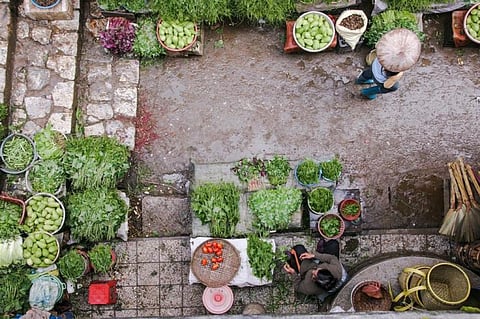

The novel coronavirus disease (COVID-19) has made nutrition elusive for those on the margins, particularly in rural areas. Pandemic or not, India continues to face the burden of malnutrition. In order to encourage rural families to grow their own vegetables, several non-profits have been helping them set up kitchen gardens.
In Madhya Pradesh, for instance, non-profit Vikas Samvad started a community-based malnutrition management programme and developed kitchen gardens in the backyards of 232 families across six districts.
The non-profit helped create a network through which 37.25 quintals of vegetables grown were shared among 425 families around them. This meant that each beneficiary family received 16 kilograms of vegetables each.
The beneficiaries included 217 malnourished children, 140 pregnant and lactating mothers and 68 elderly persons, according to Sachin Kumar Jain, social researcher and trainer associated with Vikas Samvad Human Development Resource Organisation.
He added that the initiative not only gave people self-sustenance, but was also helpful during the COVID-19 lockdown when the anganwadis were shut down. “When COVID-19 struck, this kitchen garden helped Rajji Bai’s family sustain. The family also shared about 25 kg of vegetables with five neighbouring families,” he said.
Similarly, the Maharashtra Department of Women and Child Development, in collaboration with Reliance Foundation, have been developing kitchen gardens across the state as a pilot project to reduce malnutrition and improve health and nutrition status of women and children.
The initiative covers six districts — Pune, Thane, Palghar, Yavatmal, Parbhani, and Nashik. The kitchen gardens have been established at one anganwadi in every block in each of these six districts for demonstration purposes, stated the report by National Institute of Public Cooperation and Child Development, 2018.
“Despite being the second-largest producer of food, India is home to the world’s second-largest undernourished population (195.9 million),” Shoba Suri, senior fellow Observer Research Foundation (ORF) health initiative told Down to Earth.
A recent assessment of the Reliance Nutrition Garden in 2019 found 62 per cent of vegetable requirements of rural households were met because of the kitchen gardens. It also showed that prevalence of anaemia in women decreased over 24 months of relying on these gardens for nourishment needs, according to a report by Suri.
She added that apart from food security, kitchen gardens have provided financial security: They leave families with extra stock that helps them gain an extra income.
The initiative has also empowered women in rural areas: They decide what to grow and hence, save money by avoiding trips to the vegetable market.
Achieving the Sustainable Development Goal of ‘Zero Hunger’ that it had mandated by 2030, will be very difficult, a United Nations report released on July 13, 2020, had warned.
The COVID-19 pandemic and the recession triggered by it will cause another 83 million people and possibly as many as 132 million, to go hungry in 2020, the report had said.